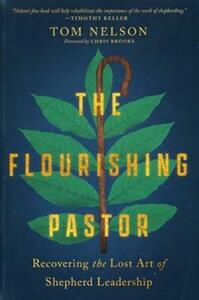Take a photo of a barcode or cover
8 reviews for:
The Flourishing Pastor: Recovering the Lost Art of Shepherd Leadership
Tom Nelson, Chris Brooks
8 reviews for:
The Flourishing Pastor: Recovering the Lost Art of Shepherd Leadership
Tom Nelson, Chris Brooks
3.5 (why will Goodreads not allow a .5 system?!)
This book had some good insights along the way, but I personally could have done with less stories of Nelson’s faithfulness and/or lessons learned. This book probably could have been ~150 pages.
This book had some good insights along the way, but I personally could have done with less stories of Nelson’s faithfulness and/or lessons learned. This book probably could have been ~150 pages.
Read multiple chapters for pastoral formation course with Wally Fleming
I had very strong and very mixed feelings about this book. I'm not a pastor, nor do I have pastoral inclinations, so I am definitely not Nelson's target audience, which may impact my perception of it. I hate to give such a low rating to a book on a subject so dear to my heart, but I'm still so ... confused that I can't in good conscience rate it higher.
Overall: Nelson is a thoughtful pastor with godly intentions, but the execution of the book leaves much to be desired.
The Good:
- Nelson seems to come back most frequently to the foundation that a pastor will only flourish to the extent that they are embedded in intimacy with Jesus.
- I read this book alongside Jesus and John Wayne, and it doesn't fall into macho or embattled or aggressive leadership. It even makes a point to use language that includes denominations with female pastors.
The Bad:
- Another reviewer mentioned Nelson having Large-Church-Pastor-Syndrome, which is pretty accurate. His advice for flourishing and finishing well seems to revolve around "I'm just in the spotlight so much and so influential, how do I handle it?" Which is a valid question, but overlooks the vast majority of pastors who will never face the temptations of "greenroom pride." And the existence of bi-vocational pastors is only mentioned once as an afterthought.
- The book is incredibly vague. I'm still not positive I know what the throughline was, and the pages are so full of generalizations and "Christianese" coated advice, that it was hard to pinpoint any actual steps to take. As mentioned above, there is a focus on intimacy, but a dearth of clarity on how such intimacy is achieved.
-Nelson is the main star of this book and every illustration features him. I think this stumbling block is one of writing tone rather than ego. While he gives us many facts about his life, there is no real vulnerability in the tone of the book, so his personal anecdotes feel self-aggrandizing rather than honest and conversational.
Theological "huh?"s
- The main metaphor for the book is that pastors should approach their work modeled after king David's shepherd leadership, especially as revealed in Psalm 78:72, "So he shepherded them according to the integrity of his heart, And guided them with his skillful hands." But there is no explanation for why a description of David in his political role as king should become a blueprint for pastors in their spiritual roles. An argument could be made, certainly, but he doesn't bother to make it.
- Similarly, he takes the circumcision-institution part of the Abrahamic Covenant and tries to make it a blueprint for an integrity-filled life. Rather than a unilateral covenant God makes with Abraham for God's own glory, the passage becomes a promise that if (not unilateral) you cultivate intimacy with God, he will grant you influence. God “invites Abraham to experience the flourishing life he had been designed to live” (69). And this despite the author of Hebrews declaring, “All these died in faith, without receiving the promises.”
This is my biggest beef with this book. Nelson’s theology is not one of flourishing in exile—it is one of achieving victory. Not quite name it and claim it, but very close. He encourages work done for God, and indeed, his focus largely revolves around work.
The gospel of this book is not a holy God’s mercy to sinners who come like beggars and are welcomed as children. It is “the gracious life of blessing, now and forever” (76).
Overall: Nelson is a thoughtful pastor with godly intentions, but the execution of the book leaves much to be desired.
The Good:
- Nelson seems to come back most frequently to the foundation that a pastor will only flourish to the extent that they are embedded in intimacy with Jesus.
- I read this book alongside Jesus and John Wayne, and it doesn't fall into macho or embattled or aggressive leadership. It even makes a point to use language that includes denominations with female pastors.
The Bad:
- Another reviewer mentioned Nelson having Large-Church-Pastor-Syndrome, which is pretty accurate. His advice for flourishing and finishing well seems to revolve around "I'm just in the spotlight so much and so influential, how do I handle it?" Which is a valid question, but overlooks the vast majority of pastors who will never face the temptations of "greenroom pride." And the existence of bi-vocational pastors is only mentioned once as an afterthought.
- The book is incredibly vague. I'm still not positive I know what the throughline was, and the pages are so full of generalizations and "Christianese" coated advice, that it was hard to pinpoint any actual steps to take. As mentioned above, there is a focus on intimacy, but a dearth of clarity on how such intimacy is achieved.
-Nelson is the main star of this book and every illustration features him. I think this stumbling block is one of writing tone rather than ego. While he gives us many facts about his life, there is no real vulnerability in the tone of the book, so his personal anecdotes feel self-aggrandizing rather than honest and conversational.
Theological "huh?"s
- The main metaphor for the book is that pastors should approach their work modeled after king David's shepherd leadership, especially as revealed in Psalm 78:72, "So he shepherded them according to the integrity of his heart, And guided them with his skillful hands." But there is no explanation for why a description of David in his political role as king should become a blueprint for pastors in their spiritual roles. An argument could be made, certainly, but he doesn't bother to make it.
- Similarly, he takes the circumcision-institution part of the Abrahamic Covenant and tries to make it a blueprint for an integrity-filled life. Rather than a unilateral covenant God makes with Abraham for God's own glory, the passage becomes a promise that if (not unilateral) you cultivate intimacy with God, he will grant you influence. God “invites Abraham to experience the flourishing life he had been designed to live” (69). And this despite the author of Hebrews declaring, “All these died in faith, without receiving the promises.”
This is my biggest beef with this book. Nelson’s theology is not one of flourishing in exile—it is one of achieving victory. Not quite name it and claim it, but very close. He encourages work done for God, and indeed, his focus largely revolves around work.
The gospel of this book is not a holy God’s mercy to sinners who come like beggars and are welcomed as children. It is “the gracious life of blessing, now and forever” (76).
Really solid book. A timely invitation into what for some will be a different way of leading. I found Nelson’s case compelling. May a generation of Shepherd Leaders rose to the task!
medium-paced
fast-paced
hopeful
reflective
medium-paced
challenging
hopeful
informative
inspiring
reflective
medium-paced
We are in the middle of a clergy crisis. I knew that before beginning my doctoral studies on clergy loneliness, mental health, and burnout, but having inundated myself in the literature I’ve become even more convinced of it. A fair amount of clergy are not doing well and many of them would step away from being pastors if it wasn’t out of financial necessity. Speaking into that situation is Tom Nelson, president of Made to Flourish, a network that seeks to empower clergy and congregation in flourishing. His new book, The Flourishing Pastor, not only identifies some of the reasons behind the clergy crisis, but offers clear, biblical, and time-tested ways of creating healthy, long-term ministry and healthy, flourishing pastors.
Nelson divides The Flourishing Pastor into three parts: (1) emphasizing the metaphor of shepherd, (2) emphasizing integrity, and (3) emphasizing the power of presence. Overall, Nelson’s thesis is simple, but revolutionary: pastors must be shepherd-leaders who live lives of integrity and who live and work among the people they serve.
In part one, The Flourishing Pastor presents three paths that Nelson writes are particularly common and perilous. First, the celebrity pastor. While this is most common in megachurches, Nelson is also clear that mega-egos reside in churches of all sizes. Churches are more than platforms or brands, and a single charismatic leader holding all the power will eventually lead to destruction. The second is the visionary leader. Vison, Nelson writes, with or without “God told me” authority, can be deceptive, especially as leaders look forward to an unrealized ideal instead of working within the context they have. Third is the lone ranger pastor, those pastors who lead alone and have no community. Leaders divorced from their community will suffer from loneliness and isolation and their ministries and personal lives will suffer as a result. So how do we find our way back?
Part two offers a better analogy for leadership, one found throughout Scripture—the shepherd-leader. Nelson offers the following guideposts toward flourishing: trusting in God, heeding the shepherd’s call, embracing obscurity, pursuing integrity, and cultivating leadership competency. Using Psalm 78 as a guide, The Flourishing Pastor works through each of these sections. Notice how unlike most leadership literature this is. It’s not focused on the followers or focused on results, but on the internal, spiritual life and posture of the leader.
The final part of the book talks about some of the practicalities of ministry. The first one that Nelson writes about is the pastor as a faithful presence within the community. My experience in church leadership and academia is that pastors are not often seen as integrated within the communities they serve. The Flourishing Pastor notes that effective leadership is going to mean understanding and living within the situations of those you have been called to serve.
My only criticism of the book is that each chapter really needed to be its own book. Because of the scope of Nelson’s work, many of the specifics he covers are written about in just a few paragraphs or pages. Nelson is able to give readers a firm foundation, but space does not allow for a deeper dive into the issue or more specific direction. It’s a criticism of praise, I suppose. The Flourishing Pastor is the beginning of the conversation, not the end. It’s broad enough that you’ll find yourself in it, yet specific enough to point you in the right direction toward wholeness and healing.
I’m imagining many pastors picking this book up based on the title, because they don’t feel that way. The Flourishing Pastor offers hope to burnt-out pastors that leadership doesn’t have to be like this. It offers gentle criticism and redirection from pastors who have been trying to do it all by themselves. It guides clergy back into their communities, asks that they think smaller, and focus on the simple task of shepherding those God has given to them. In an era of church-growth literature where bigger is better and pastors must be CEOs, Tom Nelson offers pastors a markedly different and altogether healthier option.


